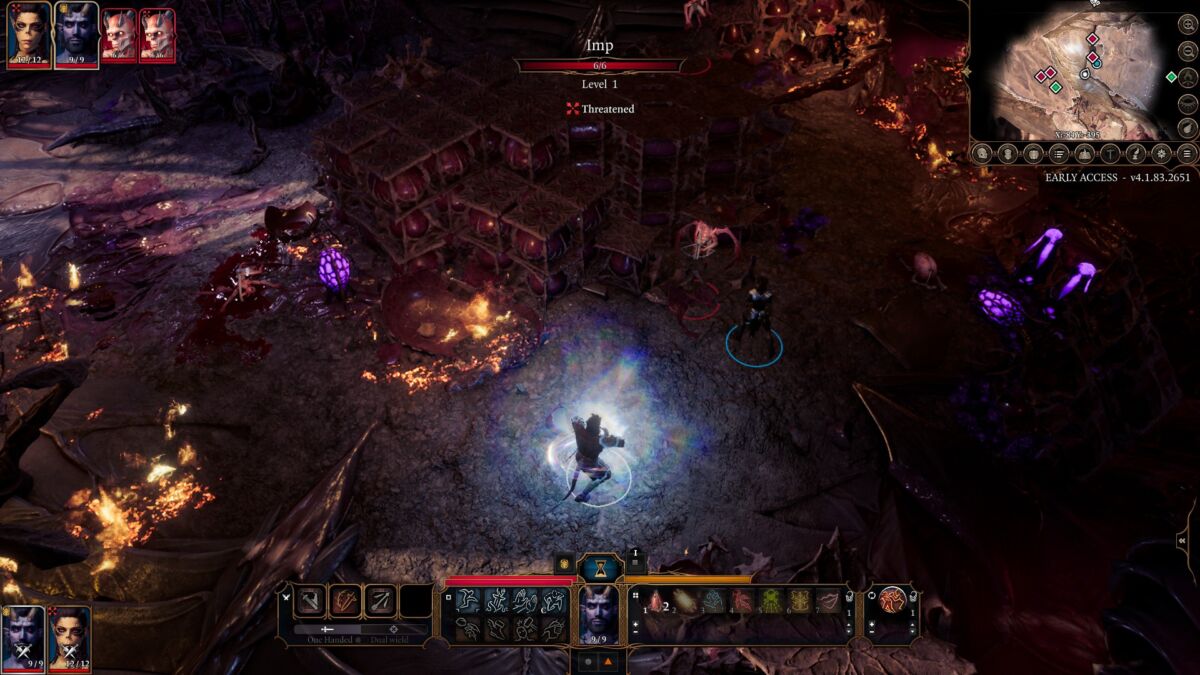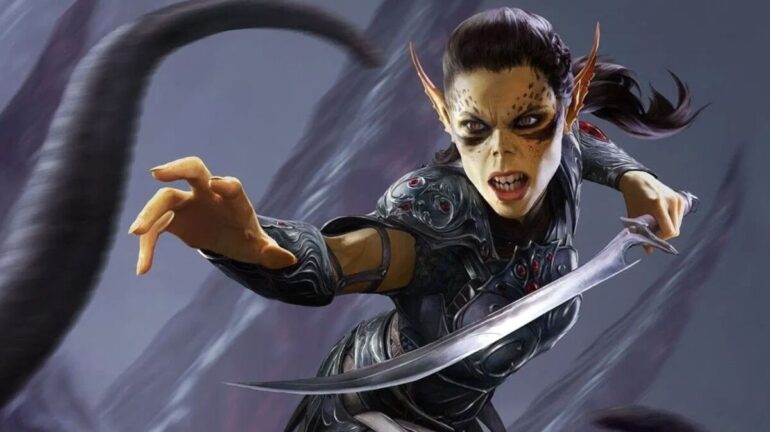Combat in Baldur’s Gate 3 is fun, fast-paced, and dynamic with numerous options for how to utilize your party effectively so you can tailor everything to a playstyle that’s right for you. It’s a great system and one of the game’s greatest strengths, even if there’s a lot to combat and it might feel a little daunting to you at first. Stick with it and you’ll be hacking and slashing your way through enemies in no time. Here’s a quick Baldur’s Gate 3 combat guide to get you started.
Combat Mechanics

To begin with, it’s important to go over the fundamental mechanics that dictate how combat works. Your chance to hit an enemy is dependent on your stats. Fighters are checked against strength, Rangers/Rogues against dexterity, Wizards/Clerics against Wisdom, and Warlocks against Charisma. The more points allocated in your given stat, the higher chance you’ll have to land your abilities.
Once you’ve successfully landed an attack, the game then rolls dice to determine the damage. For example, one of your abilities may use a d20 attack, which means a 20 sided dice is rolled to determine your attack power. There are d4, d6, d8, d10, d12, and d20 dice used depending on the spell or skill used. Through leveling up and character traits, you can also add to the number of dice that are rolled, which in-game looks like 2d10, 4d6, and so on.
Party Building

With an understanding of how combat works on a technical level, it’s time to look at how to build your party to be as effective as possible. It’s not as simple as just picking skills that benefit your player character, you need to build yourself in a way that goes well with the rest of the party. Each member should be focused on a specific role rather than trying to be an all-rounder.
My experience with the game has mostly been with the Warlock class, which I specified to be really good at manipulation. Forcing enemies to sleep, making them go crazy, and even coercing them to join my team for a short duration were all things I was able to do with the class. This worked well with my companions who I specialized in skills that complimented my setup.
My three companions were a Fighter, a Wizard, and a Cleric. The Fighter was specialized to be a tank and soak up as much damage as possible. The Wizard was specialized for defensive magic which helped protect the Fighter even longer. Lastly, the Cleric was specialized in healing magic in order to increase the party’s sustainability in fights.
As you can see, this setup had a lot of synergy between my party members. My companions were focused on distracting the enemy while my player character dealt out damage and confused our opponents. This is certainly not the only setup you can use, probably not the best either, but it proved to be quite effective in my experience so far.
To find the perfect synergy, you should try to determine how you want to play early on. You can change your specialty to some degree later on, but it’s easier to have a plan in mind when creating your character. It will also help you determine how you want to build your companions, making this a very important choice.
The best way to make this decision is to determine who you want to be in the game. It’s a role-playing game after all, so how do you want your character to act? Do you want to be a rugged survivalist who can make friends with animals? A dual-wielding warrior who rushes into fights? These represent only a couple of ways you can create a compelling story for your character. There is no right or wrong option so have fun with it.
Character Death

Another important part of the combat system in Baldur’s Gate 3 is death. When you or one of your companions runs out of health, they will fall, but they won’t be dead. Throughout the next few turns of combat, dice rolls will be used to determine whether or not the character fully dies. These are called death rolls and you will need either 3 successful throws or three fails for the outcome to be determined.
If three successful rolls are achieved then the character will not die and will return with 1 HP. Three failures will cause the character to fully die and you will need to use special items such as a resurrection scroll to bring them back. These items are hard to come by so it’s important to keep your party from reaching this stage as much as possible.
There is also an important action you can use if a member of your party falls. If another character is nearby then you can use the help action on their turn to instantly give the same result as three successful rolls. There is a negative side to this though as enemies can attack a fallen character to give them instant failed death rolls.
With the system as it currently is, you can take measures to make it unlikely that you ever reach the death stage on a character. Never send in a party member by themselves so that you can use the help action when needed and you should be fine. This method is not perfect though and multiple members can end up falling if you aren’t careful.
Spells, Special Attacks, and Rest

The final thing to mention for combat is the availability of certain actions. You have four types of abilities in combat: basic attack, special attack, spells, and cantrips. Both cantrips and basic attacks can be used over and over again without needing to rest your party, but spells and special attacks are limited. You will only be able to use these abilities a certain number of times before you will need to rest.
There are two types of rest in Baldur’s Gate 3: a short rest and a long rest. A short rest helps replenish your party’s health and some action slots, but to fully recover to full you’ll need a long rest. A long rest can only be done once per in-game day so use it wisely. If you know a big encounter is coming then having the option to rest available can be invaluable so try to save them till absolutely necessary.
With these systems in mind, you should be more than ready to engage in the combat system in Baldur’s Gate 3. The biggest mistake you can make is to be caught unaware and suffer a party wipe. Remember to pay attention to what’s going on and the stats of your party, and you’ll do just fine.
Baldur’s Gate 3 is available now in Early Access on PC.
READ NEXT: 8 Tabletop Role Playing Games For People Bored of Dungeons & Dragons
Some of the coverage you find on Cultured Vultures contains affiliate links, which provide us with small commissions based on purchases made from visiting our site.

